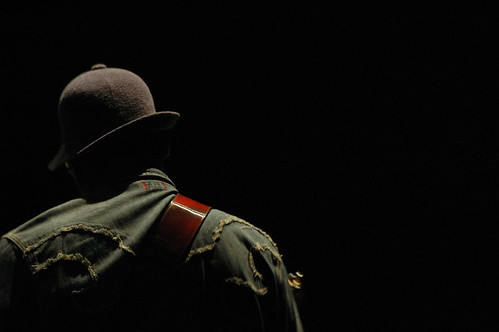An ASCAP Political Action Committee fundraising letter that seeks to vilify advocacy positions of organizations like Creative Commons has been circulating the Web. As I noted in a separate story, it’s not exactly news that ASCAP has taken issue with the licenses Creative Commons advocates. Now, however, ASCAP’s legislative advocacy arm also argues in the letter that the advocacy organization Electronic Frontier Foundation is also an enemy of artists getting paid. The EFF hasn’t made a public statement about the issue, but in a response to CDM, an EFF spokeperson says the letter “mischaracterizes” her organization.
“They imply in that letter that the EFF don’t want artists to get paid for their work,” says Rebecca Jeschke, EFF spokesperson. “For years, we’ve had a proposal for Voluntary Collective Licensing,” she says, a scheme by which users of file sharing services could contribute to funds for artists. She says the EFF has been working on the issue since 2003. “We’re interested in making sure that there’s a balance, that copyright respects the rights of the creators but also innovators and speakers, and that [the doctrine of] fair use rights [a provision of US Copyright Law] are respected.”
For more on EFF’s proposals on voluntary collective licensing, see the organization’s 2008 white paper. Ironically, the proposal explicitly cites ASCAP and similar organizations as their model for how file sharing collections could work:
A Better Way Forward: Voluntary Collective Licensing of Music File Sharing
The Precedent: Broadcast Radio
It has been done before.By voluntarily creating collecting societies like ASCAP, BMI and SESAC, songwriters brought broadcast radio in from the copyright cold in the first half of the 20th century.
What would cause ASCAP to lash out at EFF in the first place? While the EFF advocates on a number of issues unrelated to ASCAP, including privacy, government transparency, and free speech, it conflicts with some ASCAP positions in some of its recent intellectual property work. For instance, in regards to the case of United States of America versus ASCAP, EFF has criticized ASCAP in court battles over whether mobile phone ringtones should be licensed as performances, and thus subject to performing royalty collections. In legal analysis on EFF’s website last year, intellectual property lawyer Fred von Lohmann described ASCAP in harsh terms:
ASCAP (the same folks who went after Girl Scouts for singing around a campfire) appears to believe that every time your musical ringtone rings in public, you’re violating copyright law by “publicly performing” it without a license. This will doubtless come as a shock to the millions of Americans who have legitimately purchased musical ringtones, contributing millions to the music industry’s bottom line. Are we each liable for statutory damages (say, $80,000) if we forget to silence our phones in a restaurant?
ASCAP Wants To Be Paid When Your Phone Rings [EFF Deeplinks]
There’s no evidence I could find that any EFF position is advocating that music “should be free,” and ASCAP isn’t clear in the letter about either what EFF policies it opposes, or even what the legislative agenda ASCAP themselves are advocating – and for which they want money. ASCAP’s legislative site is also vague, with a link to a legislative timeline that’s now 12 years out of date, before the popularity of MP3s, Napster, iTunes, iPods, and so on. Legislative recommendations made in March to the US government range from the finer points of international trade policy and enforcement in countries of China to ASCAP talking about their anti-piracy mascot for 10-17-year-old kids, skateboard-wielding “Donny the Downloader.”
ASCAP had not yet responded to CDM’s request for comment; I will follow up with them. ASCAP does, however, have a record of a advocating tougher intellectual property enforcement, including harsher penalties and monitoring.
EFF policy is clearer, however: mandatory monitoring and penalties for Internet Service Providers and mass lawsuits don’t work, says Jeschke. And, she says, that means they also don’t work for artists. “The way, for example, the RIAA has [litigated] in the name of protecting copyright hasn’t really gotten anybody paid. They gave up their lawsuit scheme. The lawsuit campaign just kept going but file sharing continued unabated.”
The EFF is arguing Wednesday in federal court against mass lawsuits. Despite the fact that the music industry dropped the approach, filmmakers of movies like “The Hurt Locker” are now going the same route:
EFF Argues Against Mass Copyright Infringement Lawsuits in Wednesday Hearing: Predatory Suits Improperly Lump Thousands of Defendants Together
Monitoring ISPs and blocking peer-to-peer file sharing, as a recent call from a number of advocacy organizations including ASCAP advocates, is also problematic, she says. When it comes to ISP monitoring, “There are clearly privacy implications for lots of people, in addition to price implications, if ISPs need to step up their enforcement.” Even worse, she says, are policies that would take away users’ Internet access if they are deemed guilty of infringement. “Most of these three strikes policies are three accusations — not three trials where you’re found guilty of infringement. People get caught in that dragnet all the time. Taking away someone’s internet access is a really big thing, and it shouldn’t happen based on three strikes.”
Since even Jeschke acknowledges that music file sharing continues, though, what about artist income? If enforcement isn’t the answer, what is? Voluntary collective licensing is still the EFF’s prescription, says Jeschke. “There will always be some new technology,” she says. “Instead of trying to put fingers in the dam and styming innovation, we need to find ways of getting artists paid.”
In doing so, though, so long as ASCAP sees the EFF as “Copyleft” advocates who only want “free music,” and EFF analysts see ASCAP as the organization confronting Girl Scouts, it’s hard to see these two organizations collaborating on solutions any time soon.
